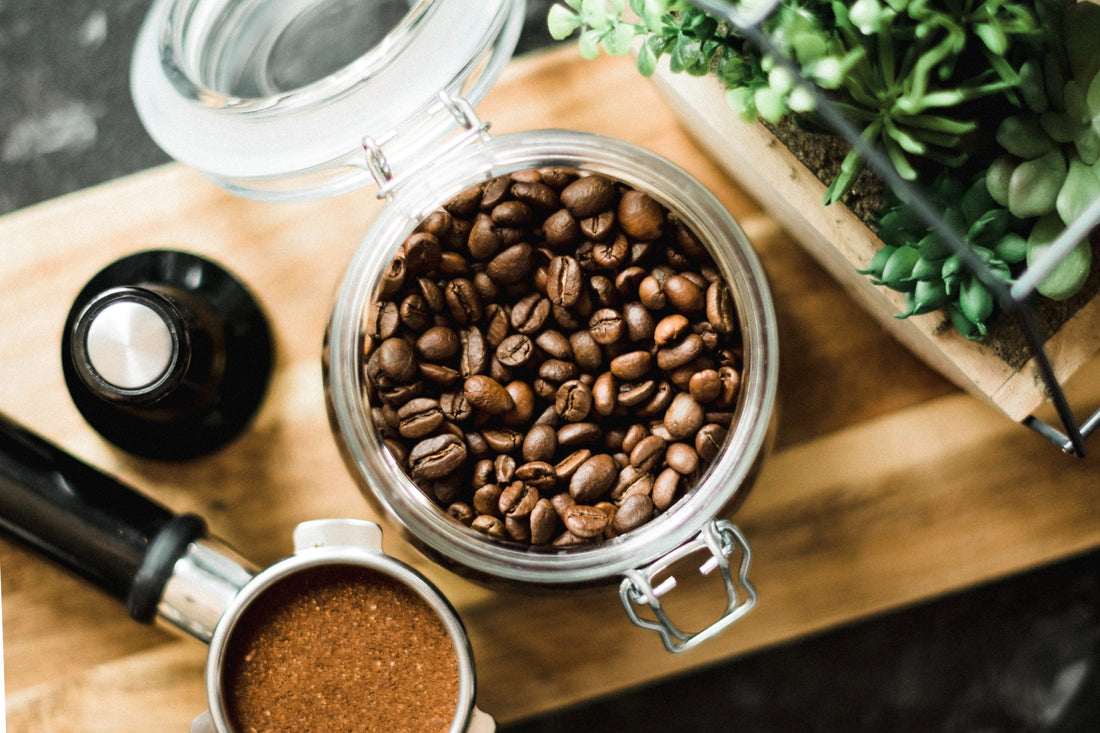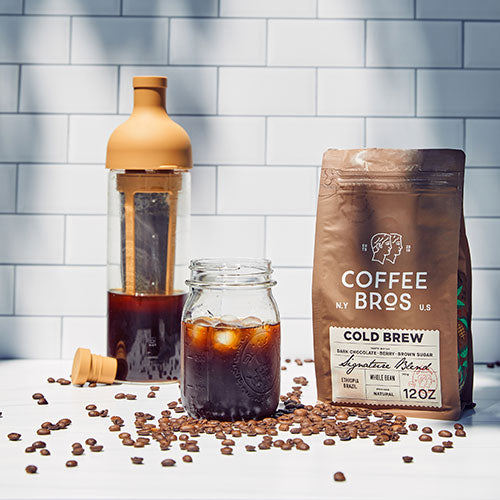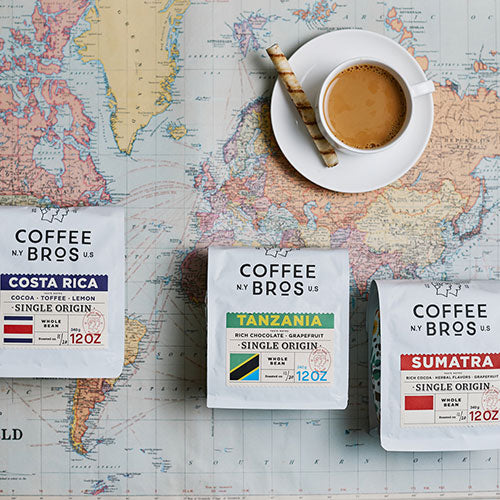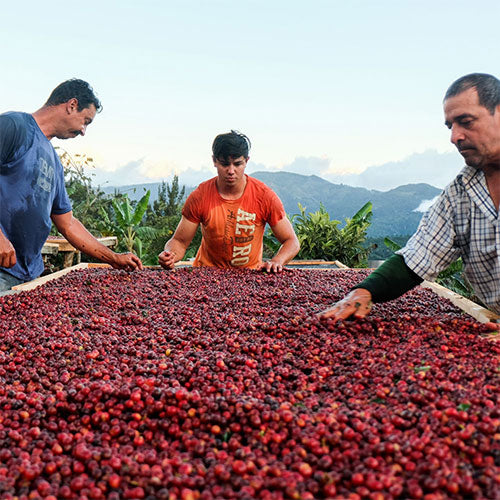Does Coffee Go Bad? The Last Freshness Guide You'll Ever Need
Let's face it. Stale coffee is the #1 killer of mornings.
We expect our morning mug of coffee to be filled with a never-ending flavor that brightens our morning and leaves us smiling for the rest of the day.
Instead, when we're met with a bland and weak taste that gives us flashbacks to awful gas station coffee, it leaves us wondering, "Did my coffee go bad?"
There's no substitute for fresh coffee—especially when it's the catalyst to a great morning.
But you don't have to deal with stale coffee! By the end, you'll rescue your mornings from the clutches of old, bland coffee and start each day with the tastiest cup of coffee you've ever had.
Does Coffee Go Bad Overview:
- How to differentiate between fresh & stale coffee beans (and why fresh coffee is always better)
- How long does whole bean coffee versus ground coffee
- The best ways to store coffee in your home
- Five tasty ways to use old, stale coffee
Fresh Coffee vs Stale Coffee: How to Tell the Difference
Telling the difference between fresh and stale coffee is super easy—rely on your sense of smell and taste!
Have you ever had the pleasure of smelling coffee while it's roasting? Heavenly, right?
This sweet, intoxicating aroma should also be evident in a bag of fresh coffee. Open a bag of fresh coffee beans and take a whiff! You should be able to pick up on different hints of flavors ranging from fruits to nuts and everything in between.
Take another whiff right after you grind it; the smells should be more intense and delightful.
Specialty coffee can taste like crisp apples, juicy oranges, decadent chocolates, floral teas, and so much more!
After all, 80% of what we taste comes from the smell. Fresh coffee boasts myriad delightful and complementary flavors, all working in tandem to kickstart your day.
But if your coffee smells and tastes bland, or worse—like nothing—it's stale.
You'll instantly know your coffee has gone stale when the scents and flavors are noticeably diminished.
Good vs Bad Coffee Flavors
Desirable flavors in coffee are easy to pick up on. From roasted almonds to lemon citrus, these are the flavors that make you smile sip after sip. Good coffee flavors will have pleasant acidity and juicy mouthfeel.
On the other hand, stale coffee can emit some flavors that will make you frown instantly. Stale coffee tastes and smells:
- Musty
- Bready
- Cardboard-like
- Dry
- Sour lemon you forgot about in the back of the pantry a year ago
(You know, the flavors that make you spit out your precious coffee.)
The most flavorful coffee notes are only present during the 1-3 week window after roasting. After that, the organic compounds within the beans begin to break down, causing the coffee to lose its flavor, thanks to a little process known as oxidation.
Read: Coffee Tastes Bitter? Here Why, And How To Fix It
As the coffee's cellular makeup breaks down and oxygen seeps into the bean, the aromatic compounds escape from the coffee bean's oils as the beans begin to decay.
Is Stale Coffee Unsafe to Drink?
Nope, stale coffee is perfectly fine to drink. But who wants to start the day with a bland, mediocre-tasting cup of coffee? (Hint: no one.)
It's like waking up on the wrong side of the bed or putting on your shirt inside out. Drinking stale coffee derails your whole day.
We'll show you how to use stale coffee beans in other tasty ways in just a moment.
Fresh is Always Best
You wouldn't eat rock-hard broccoli, would you? What about old zucchini that turns into a soup when you hold it?
So why would you settle for stale, old coffee every morning?
Fresh specialty coffee naturally tastes like creamy chocolate, tart berries, and succulent florals. When coffee is roasted properly and ground right before brewing, the flavor experience is out of this world.
Unfortunately, even if you buy fresh coffee from a locally owned roaster, there are still several factors that can cause the coffee to go stale at home:
- Pre-ground coffee - Once you grind your coffee beans, start the countdown! Ground coffee starts to lose its aromatic and flavor intensity after 30 minutes. The quick loss of aromatics is why you should avoid buying pre-ground coffee as much as possible. Invest in a home coffee grinder for the freshest cup of coffee every time.
- Roast date - Before buying a coffee bag, always look for the roast date. Was it roasted over a month ago? Chances are that coffee is already stale. Select a coffee roasted less than 21 days ago for prime coffee flavour and attributes.
- Improper packaging - The best coffee bags have a one-way valve that allows the CO2 emitted from the beans to exit the bag. This valve also ensures that oxygen is not let in. Remember, oxidation causes stale coffee! Packaging without a valve or seal = stale coffee.
- Improper storage - Storing coffee in spaces with ample sunlight and exposure to oxygen (an open coffee bag) will only speed up the processes that cause your coffee to go bad.
How long does coffee last?
The shelf life of coffee varies based on two main variables:
- Is it ground or whole bean?
- Where it's stored
How Long Does Whole Bean Coffee Last?
Your coffee's most nuanced, complex flavors and aromas—the ones that stand out as exceptional—start slowly decaying roughly 21 after roast. An unopened bag of whole-bean coffee can technically last anywhere from 6 months to 1 year past the roast date if stored properly, but those most amazing flavors will be long gone.
Read: Yes, You Can Freeze Coffee Beans (If You Follow This Trick)
Pre-ground bags of coffee can last anywhere from 1-3 months in the pantry, but as soon as you open them and expose them to oxygen, the clock starts ticking. Not good!
How Long Does Ground Coffee Last?
Remember, coffee loses its most delicious and delicate flavors only 20-30 minutes after ground. That's why we always recommend buying whole-bean coffee and grinding what you need for each batch to capture the freshest flavors.
But, if you need to use ground coffee, it can last anywhere from 1-3 months in the pantry or up to 1 year in the freezer.
How Long Does Brewed Coffee Last?
One of the defining characteristics of specialty coffee is that it retains its luscious flavors even when cool. But is coffee safe to drink several hours after brewing?
Brewed coffee can last up to 12 hours before becoming a health concern. After that, it becomes a cesspool of bacteria, collects dust particles and other airborne germs, and creates the perfect conditions for mold growth as it reaches room temperature. Ew.
You can see why we do not recommend drinking brewed coffee that's been sitting around for several hours.
However, if you put your brewed coffee in an airtight container in the fridge, you'll be able to gain a few extra hours out of your brew. The same is true for a thermos that keeps the coffee hot (inhospitable to bacteria) for a few hours.
How Long Does Cold Brew Last?
Cold brew concentrate will last anywhere from 1-2 weeks in the fridge before becoming stale and unsafe to consume. That's one benefit of brewing coffee cold—it's available on demand when you need it!
Cold brew coffee is not acidic enough to last longer than two weeks in the fridge. If you're right at the 14-day mark and wondering if it's worth it, we suggest making a fresh batch.
If you decide to pre-mix milk, cream, or sugar to your cold brew and then store it, the shelf life drops to 1-2 days.
The Best Way to Store Coffee at Home
To eliminate your chances of drinking stale coffee, you need to evaluate how you're storing your beans.
While clear mason jars may look pretty on Pinterest or Instagram, they are a nightmare for coffee freshness.
Instead, the National Coffee Association recommends home coffee lovers store coffee beans in an opaque, airtight container in a dark and cool space such as the pantry.
There's an ongoing debate in the coffee world about the effectiveness of storing coffee in the freezer. The freezer debate is due to the beans' potential for absorbing moisture.
However, most coffee pros agree that if you don't plan to use the beans for several months, storing them in the freezer in a vacuum-sealed container or packaging is fine—but only if you follow these instructions carefully.
5 Tasty Ways to Use Old, Stale Coffee
If your coffee beans do go stale, don't throw them out! There are plenty of creative ways to use the beans.
Stale coffee won't make for a remarkably vibrant cup of coffee. But it will taste great in these recipes:
1. Cold Brew Cocktail
Use what's left of the stale beans to brew a cold brew concentrate and add it to your favorite cocktail recipes. From a cold brew martini to a "cold fashioned," you can experiment with many boozy cold brew recipes.
2. Homemade Coffee Ice Cream
Coffee? Ice cream? Say no more.
If you have leftover stale coffee beans, whip up a pot and add it to this ice cream recipe for a cold treat!
3. Coffee Protein Shakes
Coffee is a natural stimulant. Add it to your pre-workout or protein shake to boost your next workout and recovery!
4. Coffee Cubes
Tired of your iced coffee getting watered down? Pour cold brew into an ice tray and freeze it overnight. Coffee cubes are perfect for those who prefer a bolder-tasting iced coffee.
5. Coffee Desserts
From mocha chocolate cakes to tiramisu, endless dessert recipes call for coffee. Even though your stale coffee beans won't produce marvellous flavors when brewed hot, they can still add that nostalgic coffee flavor to a dessert recipe.
Did anyone else get a craving for coffee and dessert?
Remember, Fresh is Best.
There's no reason to suffer through stale coffee in the morning.
Take the extra step and seek fresh roasted, whole bean coffee, because your mornings are worth it.




